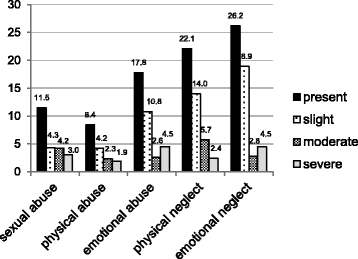Associations of childhood maltreatment with pre-pregnancy obesity and maternal postpartum mental health: a cross-sectional study
- PMID: 29166875
- PMCID: PMC5700738
- DOI: 10.1186/s12884-017-1565-4
Associations of childhood maltreatment with pre-pregnancy obesity and maternal postpartum mental health: a cross-sectional study
Abstract
Background: Pre-pregnancy obesity and postpartum mental disorders are prevalent health risks to both the mother and the offspring. The objective of our study was to examine whether a history of childhood maltreatment is associated with pre-pregnancy obesity and postpartum mental health and whether childhood maltreatment and pre-pregnancy BMI independently predict postpartum mental health.
Methods: We obtained self-reported data from 741 postpartum women before 16 weeks after delivery (M = 8.1 weeks, SD = 3.2). Childhood sexual, physical, and emotional abuse and physical and emotional neglect were assessed with the Childhood Trauma Questionnaire. Depression and anxiety were assessed using the BDI and SCL-90-R. We conducted logistic regression models adjusted for demographic covariates and co-occurrence of different types of maltreatment.
Results: 7.6% of the included women entered pregnancy with obesity. Forty-six percent reported any type of childhood maltreatment. 6.4% displayed at least moderate postnatal depressive symptomatology and 20.5% scored above the 75th percentile for postpartum anxiety. Severe physical abuse, moderate emotional abuse and severe physical and emotional neglect were associated with pre-pregnancy obesity. After controlling for the presence of all other types of childhood maltreatment, only severe physical abuse was still predictive for pre-pregnancy obesity (adj.OR = 5.24, 95% CI = 1.15-23.75). Pre-pregnancy obesity was associated with an increased risk of postpartum depression (adj.OR = 2.55, 95% CI = 1.08-6.00) but not with elevated anxiety. Pre-pregnancy obesity and severe childhood sexual abuse independently predicted postpartum depression. After controlling for histories of different types of childhood maltreatment, the association between pre-pregnancy obesity and postpartum depression attenuated to non-significance.
Conclusions: To our knowledge, this is the first study examining empirical relations between childhood maltreatment, pre-pregnancy BMI and postpartum mental health controlling for the co-occurrence of other maltreatment types. Childhood maltreatment has been found being associated with both pre-pregnancy obesity and impaired postpartum mental health and may at least partly account for the association between pre-pregnancy obesity and postpartum depression. Therefore childhood maltreatment is related to two common risk conditions during pregnancy and postpartum which bear several health risks for the mother and the child, and routine screening for histories of childhood maltreatment among pregnant women is warranted.
Keywords: Anxiety; Body mass index; Childhood maltreatment; Depression; Obesity; Pregnancy.
Conflict of interest statement
Ethics approval and consent to participate
The present study was approved by the Ethical Committee of the University of Leipzig, Germany (AZ: 187-13-15,072,013). From all mothers who were willing to participate a written informed consent was obtained.
Consent for publication
Not applicable
Competing interests
The authors declare that they have no competing interests.
Publisher’s Note
Springer Nature remains neutral with regard to jurisdictional claims in published maps and institutional affiliations.
Figures
Similar articles
-
Postpartum anxiety in a cohort of women from the general population: risk factors and association with depression during last week of pregnancy, postpartum depression and postpartum PTSD.Isr J Psychiatry Relat Sci. 2014;51(2):128-34. Isr J Psychiatry Relat Sci. 2014. PMID: 25372562
-
Childhood maltreatment and the risk of pre-pregnancy obesity and excessive gestational weight gain.Matern Child Nutr. 2016 Jul;12(3):558-68. doi: 10.1111/mcn.12147. Epub 2014 Aug 19. Matern Child Nutr. 2016. PMID: 25138565 Free PMC article.
-
Associations of postpartum mother-infant bonding with maternal childhood maltreatment and postpartum mental health: a cross-sectional study.BMC Pregnancy Childbirth. 2019 Aug 5;19(1):278. doi: 10.1186/s12884-019-2426-0. BMC Pregnancy Childbirth. 2019. PMID: 31382903 Free PMC article.
-
[Mental disorders during pregnancy and postpartum period--epidemiology, etiology, classification and treatment].Ginekol Pol. 2005 Apr;76(4):322-30. Ginekol Pol. 2005. PMID: 16013188 Review. Polish.
-
Survivors of Child Maltreatment and Postpartum Depression: An Integrative Review.J Midwifery Womens Health. 2017 Nov;62(6):706-722. doi: 10.1111/jmwh.12680. Epub 2017 Dec 1. J Midwifery Womens Health. 2017. PMID: 29194926 Review.
Cited by
-
Effects of maternal taurine supplementation on maternal dietary intake, plasma metabolites and fetal growth and development in cafeteria diet fed rats.PeerJ. 2021 Jun 3;9:e11547. doi: 10.7717/peerj.11547. eCollection 2021. PeerJ. 2021. PMID: 34141487 Free PMC article.
-
The transition to parenthood following a history of childhood maltreatment: a review of the literature on prospective and new parents' experiences.Eur J Psychotraumatol. 2018 Aug 2;8(Suppl 7):1492834. doi: 10.1080/20008198.2018.1492834. Eur J Psychotraumatol. 2018. PMID: 33488997 Free PMC article. Review.
-
The Relationship Between a Lifetime History of Sexual Victimization and Perinatal Depression: A Systematic Review and Meta-Analysis.Trauma Violence Abuse. 2023 Jan;24(1):139-155. doi: 10.1177/15248380211021611. Epub 2021 Jun 16. Trauma Violence Abuse. 2023. PMID: 34132148 Free PMC article.
-
Childhood abuse and perinatal outcomes for mother and child: A systematic review of the literature.PLoS One. 2024 May 24;19(5):e0302354. doi: 10.1371/journal.pone.0302354. eCollection 2024. PLoS One. 2024. PMID: 38787894 Free PMC article.
-
Adverse Childhood Experiences and Risk of Abnormal Body Mass Index: A Global Systematic Review and Meta-Analysis.Children (Basel). 2024 Aug 20;11(8):1015. doi: 10.3390/children11081015. Children (Basel). 2024. PMID: 39201949 Free PMC article. Review.
References
-
- Galtier-Dereure F, Boegner C, Bringer J. Obesity and pregnancy: complications and cost. Am J Clin Nutr. 2000;71:1242s–1248s. - PubMed
-
- Mamun AA, Callaway LK, O’Callaghan MJ, Williams GM, Najman JM, Alati R, et al. Associations of maternal pre-pregnancy obesity and excess pregnancy weight gains with adverse pregnancy outcomes and length of hospital stay. BMC Pregnancy Childbirth. 2011;11:62. doi: 10.1186/1471-2393-11-62. - DOI - PMC - PubMed
Publication types
MeSH terms
Grants and funding
LinkOut - more resources
Full Text Sources
Other Literature Sources
Medical


